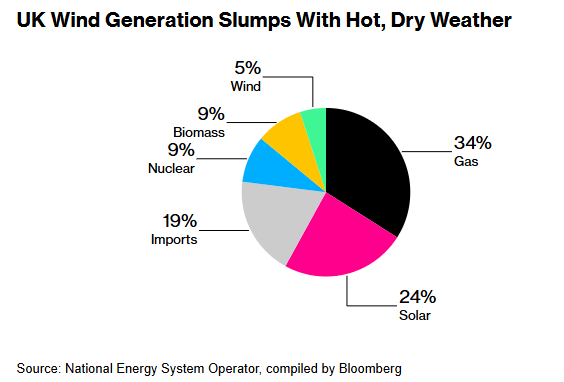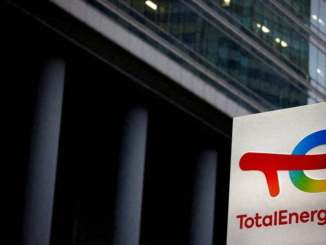
In a sweltering twist of irony, the United Kingdom’s push toward a renewable-dominated energy future is facing a harsh reality check. As temperatures soar during an unprecedented August 2025 heat wave, wind power generation has plummeted, leaving the nation scrambling to fill the void with fossil fuels. This vulnerability comes hot on the heels of TotalEnergies’ recent legal victory to shut down key North Sea oil fields, amplifying concerns over the UK’s aggressive Net Zero policies that prioritize emission cuts over energy security. Critics argue this approach is tantamount to bad energy management, dismantling reliable oil and gas infrastructure without viable replacements at the ready.
The Heat Wave’s Toll on Renewables
The ongoing heat wave has brought calm, still air across much of the UK, crippling wind turbines that form the backbone of the country’s renewable energy ambitions. On Wednesday, August 13, 2025, wind accounted for a mere 5% of the UK’s electricity generation, a stark drop from typical levels where it often contributes significantly more.
TotalEnergies’ Shutdown Victory: A Nail in the Coffin for North Sea Oil
Compounding these immediate supply gaps is the recent court ruling allowing TotalEnergies to decommission its Gryphon floating production, storage, and offloading (FPSO) vessel in the North Sea. On August 12, 2025, the High Court dismissed a challenge from minority stakeholder Nobel Upstream, paving the way for the shutdown of a critical hub supporting five oil and gas fields.
This decision strands millions of barrels of recoverable reserves, driven by escalating costs and a hostile fiscal environment, including the 2022 windfall tax that has already cost the sector over 10,000 jobs.
The shutdown is projected to slash UK domestic oil and gas production by 2%, costing the Treasury £150 million in lost tax revenue by 2027 and forcing greater reliance on imported energy.
Energy Secretary Ed Miliband’s emphasis on emission reductions under the Labour government’s Net Zero agenda has been cited as a key factor, with the court ruling that the move aligns with UK environmental targets.
Yet, this comes at a time when the UK still depends on fossil fuels for about 75% of its primary energy demand, a figure expected to drop to 23% by 2050 under Climate Change Committee (CCC) forecasts—but only if replacements scale up rapidly.
Net Zero Policies: Racing Ahead Without a Safety Net
The UK’s commitment to Net Zero by 2050, enshrined in law since 2019, involves phasing out coal, oil, and gas in favor of wind, solar, and nuclear.
Recent policies, such as the ban on new North Sea licenses and requirements for oil companies to assess end-use emissions, accelerate this shift.
The government touts progress: renewables are on track to comprise nearly half of the energy supply by the end of 2025, with wind power helping push fossil gas usage to a five-year low in some periods.
However, the CCC’s 2025 report warns that while the UK can meet its targets, it requires “further policy action,” with only 39% of needed emissions cuts backed by credible plans
Critics point to the dangers of intermittency: solar and wind penetration is growing, but without massive battery storage or flexible backups, gaps like the current wind slump could become commonplace.
The North Sea’s decline, exacerbated by shutdowns like Gryphon’s, erodes domestic production without immediate alternatives, risking higher imports and vulnerability to global price shocks. Household impacts are already mounting. Net Zero-related costs added £593 to average energy bills in 2023/24, with projections of an additional £900 by 2030 as the renewables shift intensifies.
In a nation still grappling with energy dependency—fossil fuels supply over three-quarters of needs—these policies risk economic instability, job losses, and blackouts if renewables falter.

|
Key Risks from UK Energy Transition
|
Description
|
Implications
|
|---|---|---|
|
Renewable Intermittency
|
Wind and solar output drops during calm or cloudy weather, as seen in the 2025 heat wave.
|
Increased gas reliance, higher short-term emissions, and potential blackouts without storage.
|
|
Fossil Fuel Phaseout
|
Shutdowns like TotalEnergies’ Gryphon strand reserves and cut production by 2%.
|
Lost tax revenue (£150M by 2027), job losses (200 direct, plus supply chain), and import dependency.
|
|
Policy Gaps
|
Only 39% of 2030 emissions cuts have credible plans; Net Zero adds £593 to bills annually.
|
Rising costs (£900 more by 2030), economic drag, and energy insecurity if targets miss.
|
A Call for Balanced Energy Management
The confluence of the heat wave’s wind drought and the North Sea shutdowns paints a picture of poor energy stewardship. While the UK’s Clean Power 2030 Action Plan promises a “new era of clean electricity,” it must address the elephant in the room: rushing to dismantle oil and gas without robust replacements invites disaster.






